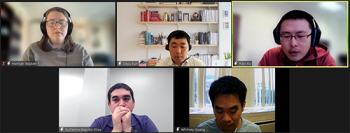
On Thursday, Jan 27, the NISS Graduate Student Network hosted a very informative panel discussion where to hear and learn about postdoctoral positions in statistics. This panel of current and former postdoctoral fellows shared many reasons you might consider a postdoctoral position after graduation.,
Panelists for this event included Dr. Whitney Huang (former postdoc), Assistant Professor at Clemson University Department of Mathematics and Statistics, Dr. Dayu Sun, Postdoctoral Fellow at Emory University Department of Biostatistics, Dr. Yibo Xu, Postdoctoral Fellow at Clemson University Department of Mathematics and Statistics, and Dr. Guillermo Basulto-Elias, Center for Transportation Research and Education, Iowa State University. This session was moderated by Hannah Waddel, Biostatistics and Bioinformatics Graduate Student at Emory University and NISS Graduate Student Network Executive Committee Member.
The panelists each introduced themselves and answered questions in an open discussion. They each shared why they decided to take a postdoc position and their responsibilities in the postdoc position.
Whitney’s experience was different from a typical postdoc. In his position he was asked to help organize and run the program he worked for, including organizing working groups and reporting back to NSF.
Dayu decided to go into academia after he didn’t feel like he fit in the industry setting. He went for a postdoc position to broaden the horizon of his research, which would later benefit his career.
Guillermo saw his postdoc position as a good opportunity to test whether applied statistics was his calling, because he thinks it's very interesting; answering questions with data science is something he enjoys doing.
Yibo took a postdoc position thinking that for success in the academic track one is expected to take a postdoc positions before obtaining a tenure track position. He took the opportunity, planning to enhance his research expertise.
What do students need to know before becoming a postdoc? One benefit is that in the 2-3 year position supported by a PI, you will have a supervisor checking on your research progress and whether the performance is satisfactory and how to improve.
“In preparing yourself to be successful in the true tenure track positions, you need to balance both research and teaching aspects.”
- Yibo
Each of the panelists discussed some of the pros and cons of postdoc positions and the qualities that are needed or useful in postdocs.
Yibo spoke about the expectations of postdoc positions, not only research expectations, but also on the production and expectations of teaching well and your growth in becoming a good instructor. His advice to prospective postdocs is to put more effort into networking, communicating, and research proposals.
Dayu stressed that independent research abilities are very important. You have to solve many things yourself and can’t expect the supervisor to hold your hand at every step.
Whitney expressed the value of networking. His advice:
“You want to be very active and let people see you; besides the research, you need to let people know that you are active in events.”
- Whitney
There is a big jump from being a student to becoming a postdoc, it is very different. One needs to learn how to do IRBs, to meet specific hard date deadlines, to demonstrate the ability to meet those deadlines.
It was really helpful when the panelists answered the question of whether postdoc positions would sponsor visas.
Guillermo is from Mexico and obtained his PhD from the US and was given a student visa with permission to work for 3 years in the US. He was able to switch to an H-1B visa and had no major obstacles obtaining that. In non-academic positions you have to go through a lottery for your visa. Yibo then elaborated on OPT, (optional practical training).
How do you find postdoc positions?
“Twitter is a great resource for finding job opportunities through well-known statisticians or research articles posted.”
- Guillermo
Panelists shared advice on the timing of when someone should consider taking a postdoc position and reasons why someone would not consider a postdoc position.
For instance, depending on your field, postdoc positions may not benefit your career. Salary pay might be too low for those who are looking for financial support. Not to mention, it’s probably not a good idea to do a postdoc for the people who do not like doing heavy research.
